Improvement in thermostability of an alkaline lipase I from Penicillium cyclopium by directed evolution†
Abstract
Lipases have been used in a wide range of applications, and thermostable lipases are highly required. Lipase I (PCL) from Penicillium cyclopium with alkali stability showed poor thermostability, resulting in a limited application in industrial processes with high temperatures. In this study, to expand the functionality of PCL, the thermostability of PCL was enhanced through direct evolution with error-prone PCR. Using a high-throughput activity assay, the double mutant PCL (L41P/G47I) with improved thermostability was selected, and then the single mutants L41P and G47I were constructed via site-directed mutagenesis. The mutant PCLs exhibited an optimum temperature 5 °C higher than the wild-type (WT). WT showed no activity with incubation at 40 °C for 90 min, whereas L41P, G47I, and L41P/G47I displayed 11%, 44%, and 23% of their maximal activity after incubation at 45 °C for 60 min. Meanwhile, the half-life at 45 °C of L41P, G47I, and L41P/G47I was 7-, 13-, and 9-fold higher, respectively, than that of WT. Moreover, G47I, L41P/G47, L41P, and WT were successfully applied in the synthesis of ethyl propionate with conversions of 45%, 27%, 23%, and 8%. The studies of circular dichroism spectroscopy and fluorescence spectroscopy indicated the lower flexibility and higher compactness of the structure of the mutant PCLs as compared with WT. Combining these results and analysis of the three-dimensional structure modeling, the mechanism responsible for the improvement of the thermostability was elucidated, which demonstrated that Leu41Pro and Gly47Ile could stabilize the structure of PCL through hydrophilic/hydrophobic interactions, proline substitution, and helix propensity.



 Please wait while we load your content...
Please wait while we load your content...